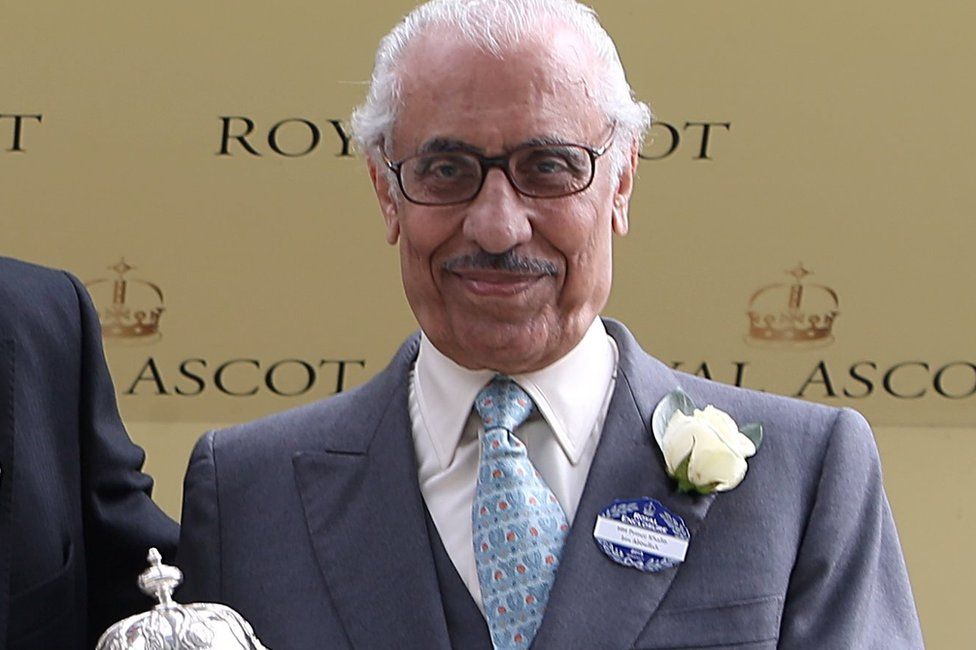Farm subsidies: Payment to billionaire prince sparks anger
- Published

Taxpayers are paying more than £400,000 a year to subsidise a farm where a billionaire Saudi prince breeds racehorses.
The Newmarket farm of Khalid Abdullah al Saud - owner of the legendary horse Frankel - is among the top 100 recipients of EU farm grants in the UK.
The system's critics say Brexit will let the UK redirect £3bn in subsidies towards protecting the environment.
A spokesman for the prince declined to comment.
Farm subsidies swallow a huge chunk of the EU's budget. They were started after World War Two to stimulate production, but led to food mountains that had to be dumped.
A compromised reform process - the so-called "greening" of the Common Agricultural Policy - resulted in farmers mostly being paid depending on how much land they own.
The UK's top beneficiaries include estates owned partly or wholly by the Queen (£557,706.52); Lord Iveagh (£915,709.97); the Duke of Westminster (£427,433.96), the Duke of Northumberland (£475,030.70 ) the Mormons (£785,058.94) - and many wealthy business people.
Asked if the Queen thought it appropriate to receive taxpayers' subsidy based on the size of her land holding, a spokesman for the Palace said: "Subsidies are open to all farmers, and are received on the Queen's private estate. We would not comment beyond the detail that is already in the public domain."
A spokesman for the Duke of Westminster also declined the question, but said the farm produced quality food while taking the environment very seriously.
In EU-wide rankings, the UK scores highly on the transparency of information about who receives what, although the identity of some landowners on the list is concealed through offshore trusts.
The big conservation organisations Natural England (£970,580.50), the National Trust (£2,666,880.26) and the RSPB (£2,002,859.51) are among the top recipients.
Source: Defra
They also get extra public money under a parallel grant designed to encourage wildlife. The latter two argue for reform of the subsidies.
A campaign for reform is being launched by Greenpeace, which does not normally focus on farming, but says Brexit demands a re-examination of many policies.
The group said it was an "outrage" that subsidies were given to those such as Khalid Abdullah al Saud, who owns Juddmonte Limited farms. His stallion Frankel is said to be worth over £100m for breeding.
Greenpeace chief scientist Doug Parr told BBC News: "The subsidy system is utterly broken. We need public money spent on farming to be offering demonstrable public benefits."
The Taxpayers' Alliance added: "Farmers should be put on notice. Taxpayers shouldn't be handing out what are effectively land subsidies, often to extremely wealthy individuals."
Top of Defra's 2015 payments list is Aberdeenshire farmer Frank Smart, whose business netted grants of £2,963,732.77.
He told BBC News: "I don't want to discuss any part of my business with the media, thank you."
Mr Smart would not comment on complaints that he has been "slipper farming" - a technique in which farmers buy up land principally for the grants attached to it. The practice is not illegal but it has been heavily criticised.
One MP, the Conservative Richard Drax, is in the top 100 beneficiaries. His jointly-owned farm received £351,752.29.
Past EU attempts to radically reform the subsidies have been blocked by Europe's farmers.
Two ministers in the government's environment department, Defra, receive farm subsidies.
Lord Gardiner of Kimble declares an interest as a partner in CM Robarts & Son, (SIC) which nets £45,479.19 in direct payments.
George Eustice is a director of a Cornish farm receiving £2,313.
A Defra spokesman said Mr Eustice and Lord Gardiner had properly declared potential conflicts of interest and both had been cleared for discussions on the future of farm grants.
The spokesman said that in the context of Brexit, all policies were being re-examined, adding: "The secretary of state has underlined the need for continuity for farmers and is looking forward to working with industry, rural communities and the wider public to shape our plans for food, farming and the environment outside the EU."
In the Tory leadership contest, Environment Secretary Andrea Leadsom promised farmers that she would continue farm subsidies.
The Treasury has already guaranteed direct payments for land ownership until 2020, although to the dismay of conservation groups has not committed to continue funding wildlife protection on farms.
The Tenant Farmers' Association wants to keep the £3bn total subsidies but split the cash between enhancing the environment, creating infrastructure to develop farm businesses, and public funding to promote British food.
The Country Landowners Association seems to think reform is inevitable.
"Brexit has given us the opportunity to develop a new food, farming and environmental policy which can deliver even greater benefits for the natural world," its spokesman Christopher Price said.
The farmers' union, the NFU, did not comment when asked if it accepted reform of the grants system was now inevitable.
Many environment groups believe reform of the labyrinthine grants system is beyond the capacity of Defra, which has lost many staff in recent savings. They want a broadly based commission to outline how much the government needs to spend on farming to meet the objectives of its 25-year plan to protect the environment.
Follow Roger on Twitter @rharrabin